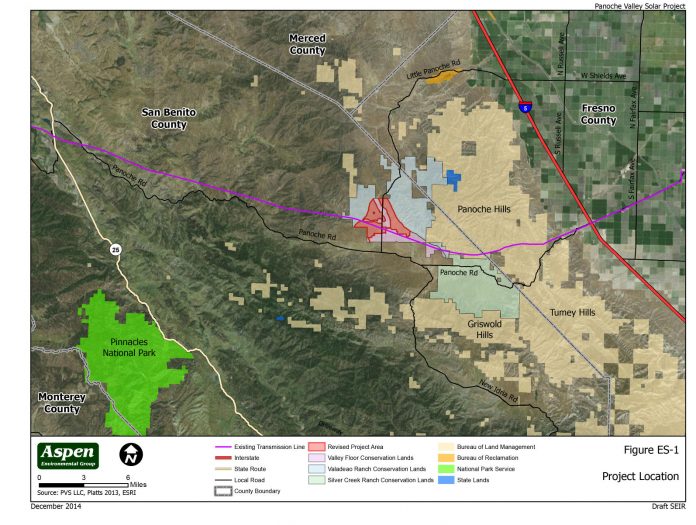Among the many hurdles for Panoche Valley Solar before moving ahead on its 247-megawatt project was a concern about mineral rights and the potential that another party could pursue resources on affected properties.
The company quelled those concerns through legal action finalized in May, when Judge Harry Tobias ruled in favor of the plaintiffs—there were no living defendants found—and deemed those mineral rights as expired, according to court records and one of the solar company’s attorneys, Brad Sullivan.
“The mineral rights underneath the properties hadn’t been used in over 100 years,” Sullivan said.
Still, Sullivan and Paul Rovella with the L&G law firm had to make an attempt to find the companies owning the mineral rights—Dos Palos Oil & Gas and San Jose Petroleum—and convince a judge to deem those rights as expired.
“You can declare them to be expired,” Sullivan said. “They don’t expire on their own. You have to affirmatively request the court. A lot of companies that own them do not exist.”
Tobias ruled in a case management conference that the plaintiffs are the possessors of the properties and they satisfied their burden; and that the defendants have no right to any claims, profit or titles on the properties, according to court records.
Panoche Valley Solar filed for the action in December. It was yet another roadblock as the company faces the final stretch before prospective construction, planned for the fall.
Panoche Valley Solar is continuing to fight environmental groups in court—the Sierra Club and Audubon Society last week filed a second lawsuit attempting to halt the project—while the firm also awaits permitting decisions from four state and federal agencies.
As for the mineral rights, even if the attorneys had found living owners who could claim them, Sullivan contended it would not have threatened the project.
“It would not have pulled the rug out from under us,” he said. “It would have been kind of an inconvenience.”
Incidentally, Sullivan’s law firm also represented the No on Measure J campaign in its fight against the initiative, to ban fracking and other enhanced petroleum recovery, which passed on the November ballot.
Sullivan said part of what prompted the court action on mineral rights was the Measure J debate and how it may have attracted the attention of oil companies.
“Oil companies are aware of San Benito County,” he said. “If they’re not, they certainly are now because of the Measure J campaign.”
The California Public Utilities Commission in March approved a power purchase agreement for the Panoche Valley Solar project. Prior to that, PV2 in August reached a 20-year power purchase agreement with Southern California Edison for the 247 megawatts. The agreement with the Panoche Valley project is over 20 years with an expectation to be online by 2019.
Solargen Energy first proposed the Panoche Valley project in 2009, but when the company encountered financial problems in 2011, PV2 bought the assets for the project. Supervisors first approved of the solar project in 2010 when its scope was much larger.
With the initial proposal, there was talk of building a 1,000-megawatt solar farm on up to 30,000 acres. As recent as late 2013, the project was planned for 339 megawatts. The current version of the endeavor includes a total of 24,000 acres of open spaces, or 10 times the size of the project area.
Look back for more.










